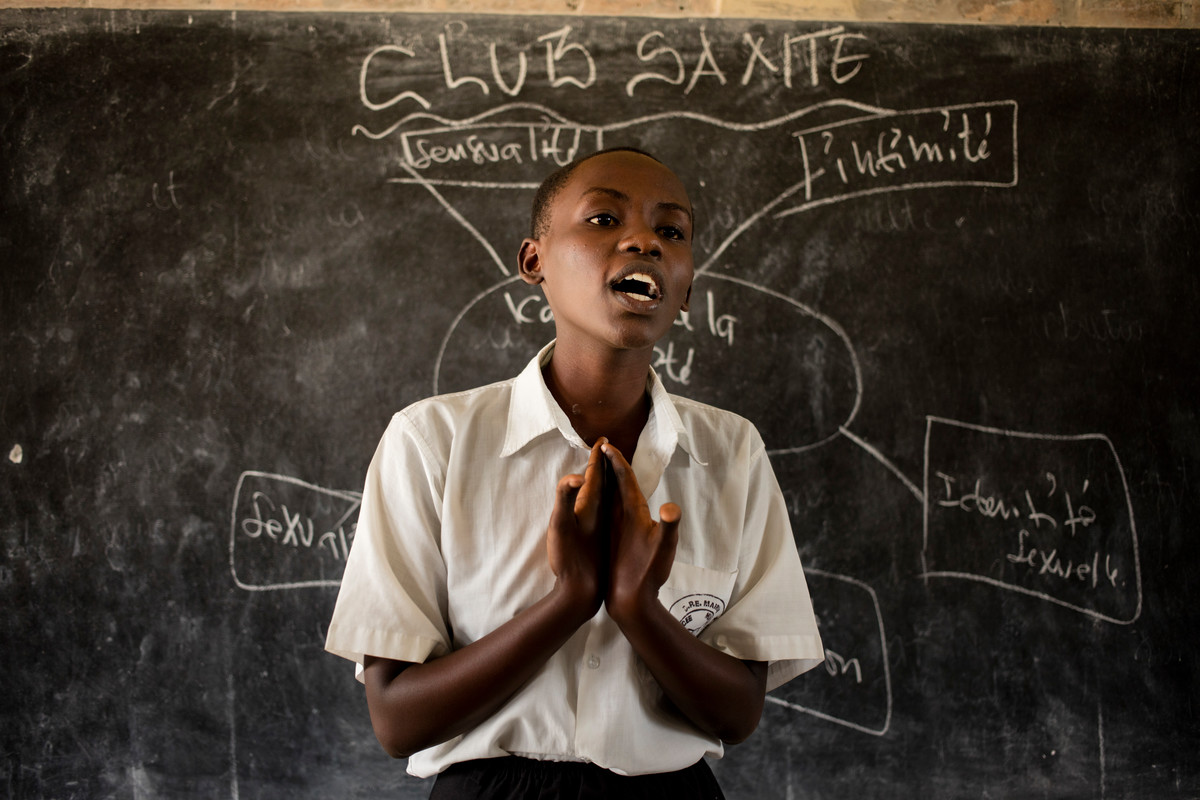Comprehensive sexuality education (CSE) is a sex education approach that focuses not only on the reproductive aspects of sexuality, but also on the emotional and social aspects that young people need to determine their sexuality and thrive in their lives.
CSE sees sexuality in a holistic way and in the context of emotional and social development and considers young people as sexual beings. The most recent national health survey carried out by the DHS program in Guinea has shown some severe issues which highlight young people’s need for good quality sexuality education. For example:
- 63% of girls get married before the age of 18
- More than a quarter (26%) of adolescent girls are mothers
- 90.6% of adolescent girls have undergone female genital mutilation (FGM)
- The rate of HIV/AIDS is 50 times higher for girls than for boys
- More than a quarter (26.5%) of girls (aged 10-24) have experienced violence
- More than a quarter (26.1%) of adolescents and young people (aged 10-24) are out of school
Indeed, despite the efforts made, sexuality remains a taboo subject for us in Guinea, because it is influenced by religions and customs, which creates reluctance, fear and refusal of information for young people, some of whom are already sexually active.
Young people and adolescents still do not receive adequate services tailored to their sexual and reproductive health needs. Most families in Guinea do not dare to talk about sex at home. We must intensify the information in order to reach the most remote and disadvantaged corners of our communities.
Family participation
For full sexuality education to be achieved, it is necessary that everyone in the family participates and plays a role. This should challenge the Guinean state, technical and financial partners and all stakeholders to act quickly by intervening in favour of CSE in order to reduce the risks for young people and adolescents.
I want to see my peers live fulfilled and responsible lives, through the provision of comprehensive sexuality education in school or extra-curricular (for example through parent-child dialogue). I want to see young people living in rural areas enjoy the same benefits in terms of information and intervention on sexual and reproductive health.
I want to see young leaders involved in making decisions about youth access to CSE, because doing something for young people without young people is against young people.
I hope that the integration of comprehensive sexuality education in training curricula, and sharing awareness through social media will be a considerable asset for young people in school. For young people out of school I hope to see regularly organized communication activities through educational talks, door-to-door sensitization, and daily media spots in national languages, while involving religious and community leaders.
Starting at an early age
Thus, it is important to start CSE at an early age because it is the only way for the child to know and control their own body, and, as the UNESCO International Technical Guidance shows; to delay first sexual intercourse, to reduce risk-taking and increase use of condoms and contraception, to reduce the frequency of sexual intercourse and the number of sexual partners among young people.
I think that parents have a really important role to play in youth access to CSE in and outside of school. In short, parents must absolutely respond to their children's questions in a natural way. Although they should receive sex education in school, home education should not be missed because it is also important.
If neither school nor parents talk about sex education to young people and adolescents, the situation will be deplorable. They are an essential point of contact and if they are well informed, they will be able to facilitate this process.
Antoine Fassou Loua - Young Peer Educator at Association Guinéenne pour le Bien-Etre Familial, IPPF member association in Guinea.
when
country
Guinea-Conakry
Blog Series
Youth voices
Subject
Comprehensive Sex Education
Related Member Association
Association Guinéenne pour le Bien-Etre Familial











